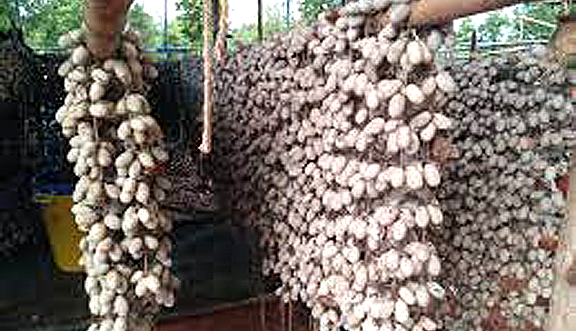Lahunipara/Bonai: Sericulture or silk farming is all set for a big leap in Sundargarh as the district administration has initiated construction of the ambitious Tussar Silk Park at Khuntgaon under Lahunipara block Saturday.
Although some locals had opposed it, majority of the people and people’s representatives supported the project. According to reports, an estimated Rs 24 crore will be spent for the project which will come up on 5 acre of land.
The opponents said that the land being used for the Tussar Silk Park is currently used as a playground by students of Khuntgaon government high school. They demanded to shift the project somewhere else.
In the past, the project supporters and opponents had taken up the issue to the Collector, the BDO, the sub-collector, MLA and MP. Khuntgaon sarpanch Ajay Kumar Nayak said that the Tussar Silk Park will create a good scope of employment for local youths while playing a key role in boosting sericulture in the region.
Scores of farmers in the three blocks of Lahunipara, Bargaon and Bisra under Bonai sub-division have been producing silk. They are engaged in Seed Crop Rearing (SCR) and Commercial Crop Rearing (CCR).
They have been selling silk cocoons through local primary cooperative societies. Tussar Silk Park is being established under the Odisha Livelihoods Mission (OLM) in association with the Sericulture department with funding from Sundargarh District Mineral Foundation (DMF).
The project envisages the concept of ‘Soil to Silk Ending in Fabric’ and aims to provide livelihoods to the forest fringe communities. It is said that there are about 5,000 registered sericulturists in Lahunipara, Koida and Bonai of Bonai sub-division besides Bisra and Bargaon blocks.
However, about 3,000 of them are active in sericulture activities. Silk farmers and their family members traditionally rear natural silkworms on host trees like Asan and Arjun in adjacent forests to get cocoons.
The trees have been planted on around 500 hectare land in Bonai. Two crops are grown annually with seed crop rearing done during July-August and commercial crop rearing in November.
On an average, a farmer can earn a minimum of Rs 20,000 from 100 healthy trees in a single crop season. The upcoming park will have reeling, re-reeling, spinning, weaving, textile printing and embroidery facilities.
PNN






